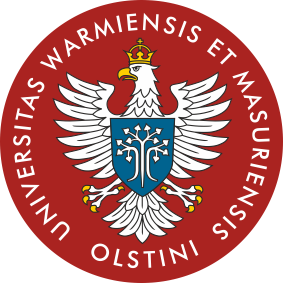Programme
THE FULL CONFERENCE PROGRAMME CAN BE FOUND HERE
1st day (16.06.2025 r.)
Venue: Kazimierz Wielki University, Faculty of Geographical Sciences
Address: Kościelecki Square 8, 85-033 Bydgoszcz
8:30-9:30 Registration
9:30-10:30 Official opening of the conference and welcome speeches of invited guests
Official greetings of participants:
- Michał Habel, Dean of the Faculty of Geographical Sciences and Aleksandra Jezierska-Thöle, Vice-Dean of the Faculty of Geographical Sciences (Kazimierz Wielki University in Bydgoszcz)
- prof. Bernard Mendlik, Rector of Kazimierz Wielki University
- Representative of the Voivode of Kujawsko-Pomorskie
- Mirosław Kozłowicz, Vice-President of Bydgoszcz
- Mateusz Balcerowicz, Vice-President of Polish Waters National Water Holding for Flood and Drought Protection
- Ewa Patalas, Regional Director of Environmental Protection in Bydgoszcz
10:30-11:30 Session I
Chairs: Anna Klimach, Michał Habel
Agnieszka Dawidowicz, Małgorzata Dudzińska, Marta Gross (University of Warmia and Mazury in Olsztyn, POLAND) Towards Sustainable Urban Living: A Method for Evaluating Housing Estate Attractiveness Considering Blue Infrastructure Functionality and Accessibility
Kęstutis Zaleckis, Indrė Gražulevičiūtė-Vileniškė, Gediminas Viliūnas (Vilnius Academy of Arts, LITHUANIA), Milda Sutkaitytė, Danielius Jurčiukonis, Mindaugas Pakalnis, Rūta Marija Slavinskaitė, Kamilė Kisieliūtė (Construction Sector Development Agency - SSVA, LITHUANIA) Multifunctionality and Urban Form: A Nature-Inspired Approach to Sustainability in Lithuanian Cities and Towns
Marie Thöle, Richard Schensar (Charite University in Berlin, GERMANY) Waterborne- diseases and water-associated diseases in Germany and Poland
Ling He (Xi'an University of Science and Technology CHINA), Aleksandra Jezierska-Thöle (Kazimierz Wielki University in Bydgoszcz, POLAND)Community-based tourism and ecotourism potential in the Wei River basin: perspectives on integrated development along a major tributary of the Yellow River
11:30-12.00 Coffee break
12:00-13:30 Session II
Chairs: Agnieszka Dawidowicz, Dawid Szatten
[online] Njideka Maryclara Aguome, Keone Kelobonye, Nonso Izuchukwu Ewurum (University of Botswana, BOTSWANA) Community Agency and the Social NPV of Eco-Tourism in Mangrove Restoration: Evidence from the Niger Delta
[online] Aziz Cumhur Kocalar, Can Mavruk (Nigde Omer Halisdemir University, TURKEY)Turkey’s Agricultural Water Crisis and Solutions
[online] Sopio Gorgijanidze, V. Trapaidze, Z. Gulashvili, G. Jincharadze, T. Chitadze (Georgian Technical University, GEORGIA) Georgia's water resources for the country's sustainable economic development
[online] Adam Doskocz, Jan Kuryj (University of Warmia and Mazury in Olsztyn, POLAND)Analysis of riverbeds changes under the influence of environmental and anthropogenic factors
[online] Justyna Jastrzębska (SGGW - Warsaw University of Life Sciences, POLAND) Fortifications and Water Systems of Warsaw – An Analysis of the Relationship Based on a Selected Fort
[online] Rodica Sîrbu, Vadim Cujbă (Technical University of Moldova, MOLDOVA) Assessment of water resources use within the Raut River basin (Republic of Moldova)
13:30-14.45 Lunch break
14:45-16:30 Session III
Chairs: Aleksandra Jezierska-Thöle,Krzysztof Kupren
[online] Barbara Prus, Stanisław Bacior (University of Agricultural in Cracow, POLAND) Land properties and their boundaries in the vicinity of watercourses and reservoirs
[online] Zemour Youcef (University of Oran 2, ALGERIA) Conceptual Model of Radionuclide Behavior and Hydrogeochemical Evolution in Major Hydrothermal Systems of Northwestern Algeria
[online] Daiva Petrėnaitė, Ramutė Narkūnienė, Inga Jakštonienė (Utena Higher Education Institution, LITHUANIA)Impact of self-propelled watercraft on lake ecosystems in the Eastern Aukštaitija region (Lithuania): a survey of holidaymakers' opinions
[online] Marek Walacik, Aneta Chmielewska (University of Warmia and Mazury in Olsztyn, POLAND) Property market tessellation - does the solution solve the problem of environmentally attractive properties valuation?
[online] Ewelina Idziak (Kazimierz Wielki University in Bydgoszcz, POLAND) Innovative FinTech Solutions for Blue Economy
Poster session (short presentations)
Chairs: Marta Gross, Monika Kozłowska-Adamczak
Rafał Grulke (University of Lodz, POLAND) Prospects for utilizing river flow under meandering conditions to support self-purification of river waters
Karolina Serwach, Maciej Ziułkiewicz (University of Lodz, POLAND) The role of the hyporheic zone in the distribution and accumulation of microplastics in the bottom sediments of a headwater stream: the case of Struga Dobieszkowska (Łódź Voivodeship, central Poland)
Marek Jóźwiak (Bydgoszcz University of Science and Technology, POLAND) Patterns of Visual Attention to Sustainable Tourism Content in Advertising Materials
Krzysztof Kupren, Anna Hakuć-Błażowska, Tomasz Czarkowski, Konrad Turkowski (University of Warmia and Mazury in Olsztyn, POLAND) Opportunities and limitations of diversification of fish production in earthen pond in Poland - the opinion of farmers
Patrycja Essing-Jelonkiewicz, Alicja Gonia(Kazimierz Wielki University in Bydgoszcz, POLAND) Tourism in Koronowo based on the revitalised area along the Brda River
Patrycja Sieg (Bydgoszcz University of Science and Technology, POLAND) The Role of Small Hydropower in the Green Energy Transition of the Kuyavian-Pomeranian Voivodeship: Opportunities, Limitations, and Best Management Practices
[online] Nuno S. A. Pereira (Polytechnic Institute of Beja, PORTUGAL) Synthetic aperture radar to monitor wetlands: the Danube Delta case study
[online] Ana Isabel Barros Pimentel Rodrigues (Polytechnic Institute of Beja, PORTUGAL) From Fragmentation to Integration: Applying Systems Thinking to Alqueva as a Lake-Destination Area
[online] Anna Goździejewska, Marek Kruk, Katarzyna Glińska-Lewczuk (University of Warmia and Mazury in Olsztyn, POLAND) Zooplankton as an indicator of ecosystem condition in water resource management
[online] Magdalena Bowszys, Rafał Gawryński(University of Warmia and Mazury in Olsztyn, POLAND) Wildlife tourism in the Biebrza Valley
16:30-16:45 Coffee break
17:00-18:00 Water tram cruise
18:30/18:45 Bus transfer from the Faculty of Geographical Sciences, UKW, to 'AMW Rewita Pieczyska' holiday resort in the Koronowo Commune (Address: Wypoczynkowa Street 1, 86-010 Koronowo), with overnight accommodation included in the conference fee.
20:00 Gala dinner
2nd day (17.06.2025)
Venue: Koronowo commune
9:00-11:00 Workshop and transfer to the venue - Synagogue in Koronowo;
Address: Szkolna Street 6, 86-010 Koronowo
11:00-11:15 Official opening of the 2’nd day of conference and welcome speeches of invited guests
- Official greetings of participants
- Michał Habel, Dean of the Faculty of Geographical Sciences and Aleksandra Jezierska-Thöle, Vice-Dean of the Faculty of Geographical Sciences (Kazimierz Wielki University in Bydgoszcz)
- Patryk Mikołajewski, Mayor of Koronowo Commune
- Grażyna Chyła-Konecka, Director of the Municipal and Communal Cultural Center in Koronowo
11:15-12:15 Session IV
Chairs: Patrycja Essing-Jelonkiewicz, Emil Andrzej Karpiński
Dawid Szatten, Marta Brzezińska, Michał Habel (Kazimierz Wielki University in Bydgoszcz POLAND) “Dead” Brda River in Koronowo, are really a “dead” river?
Aleksandra Jezierska-Thöle, Patrycja Essing-Jelonkiewicz (Kazimierz Wielki University in Bydgoszcz, POLAND) The role of the river in the sustainable development of the town of Koronowo
Agata Jelińska (Kazimierz Wielki University in Bydgoszcz, POLAND) Quest Tourism in Revitalized Riverside Areas: A Case Study of Stary Fordon
Anna Klimach, Elżbieta Zębek (University of Warmia and Mazury in Olsztyn, POLAND)The Utility of Water-Based Databases in Groundwater Management: Legal and Systemic Perspectives
Fabian Miszewski (University of Warmia and Mazury in Olsztyn, POLAND)The potential of GIS tools in managing green infrastructure resources at the local level
12:15-12:30 Coffee break
12:30-13:30 Session V
Chairs: Aleksandra Jezierska-Thöle, Grażyna Furgała-Selezniow
Emil Andrzej Karpiński, Andrzej Skrzypczak (University of Warmia and Mazury in Olsztyn) Angling tourism in Poland
Bogdan Wziątek (University of Warmia and Mazury in Olsztyn, POLAND) The role of angling recreation in the economy of the Oder area
Agata Pawłat-Zawrzykraj, Piotr Kaliszek (SGGW - Warsaw University of Life Sciences, POLAND) The possibility of developing water sports and recreation in Warsaw regarding external location conditions
Monika Kozłowska-Adamczak, Nina Paradowska, Wiktoria Grzesik, Beata Kubiak (Kazimierz Wielki University in Bydgoszcz, POLAND) The functions and development of selected riverside areas in Bydgoszcz and the process of creating a modern "waterfront" for the tourism and recreation in the city
13:30-15:30 A walk in the centre of Koronowo and lunch
15:30-16:30 A short trip (View of the Brda River from the narrow-gauge railway bridge in Koronowo, located near the sewage treatment works) and return to Bydgoszcz


